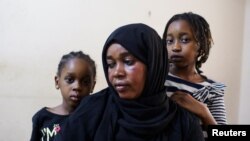"They saw everything, the gunfire was falling on us at home... they saw horrible scenes," said Mahmoud, speaking at a shelter in Cairo where she has found sanctuary for her two daughters.
"She still screams at night and cries out to me 'why are these people coming to kill us?'" she said.
In Khartoum, Mahmoud describes how her daughter would run to her in alarm whenever she heard warplanes overhead, fearing they were in danger.
The account is a glimpse of the trauma being suffered by hundreds of thousands of children in Sudan, where the army and paramilitary Rapid Support Forces have been locked in weeks of conflict that has killed hundreds of people.
UNICEF, the U.N. children's agency, says 368,000 children have been forced from their homes in Sudan, and a further 82,000 have fled into neighboring states. It estimates 190 children were killed in the first 10 days of the war, and 1,700 injured.
"Before the conflict, we already had 7 million children, between 6 and 18 years of age, of school-going age, out of school. We already had 611,000 kids under five suffering from severe acute malnutrition, with 3 million kids under five suffering overall from malnutrition," UNICEF country director in Sudan, Mandeep O'Brien, told Reuters.
"With this conflict, we have seen a nationwide closure of schools and educational institutions," she said.
"Children are under enormous distress, as you can imagine, particularly in the hot spot locations of this conflict due to continuous bombardment and shooting. We have seen this and experienced this firsthand," she said.
The latest reports show about half of the families arriving from Sudan into Chad have school-aged children. The U.N. High Commission for Refugees says 83% of these children had been attending schools in Sudan before they were forced to flee.
In Port Sudan on the Red Sea, where thousands of people have fled in the hope of evacuation, a group of artists has volunteered to organize recreational activities for children to alleviate the pressures on their mental health.
"We have a number of cases for children who have Post-Traumatic Stress Disorder who were transferred to the psychiatric hospital, we also have similar cases among adults," said Rasha Mohamed Taher, the head of mental health division at the Sudanese health ministry in Red Sea State.
"The thing that we can do now for children is to support them and alleviate the bad psychological impacts on them."








